The best online teaching platforms in 2025 are Whop, Thinkific, Udemy, and Teachable. In this guide, we compare the 20 best teaching platforms, their key features, pricing, and what they're best for.
Key takeaways
- Platform pricing models vary drastically—from free tiers with limits to flat monthly fees—so match your choice to your audience size and growth stage.
- Revenue splits matter: Udemy takes 63% of marketplace sales but only 3% of referral sales, rewarding creators who bring their own audience.
- All-in-one platforms like Whop, Kajabi, and Thinkific let you combine courses with communities and digital products to maximize earning potential.
The best platforms for online teaching in 2025 are Whop, Thinkific, Udemy, and Teachable. Whop tops our list with its 2.7% + $0.30 transaction fee and business customization features like custom apps and easy setup.
Online teaching and e-learning are in a bigger, better place than ever before, and the industry is now getting the recognition and trust of both big businesses and individuals alike.
As such, there’s never been a better time to start an online teaching business of your own. With so much demand and opportunity out there, it’s just a matter of packaging your skills and knowledge and delivering it to learners—and a great online teaching platform makes that so much easier.
So, which platforms rule the roost, and what’s the best choice for you? Here’s our selection of the best in the business.
20 best online teaching platforms
1. Whop
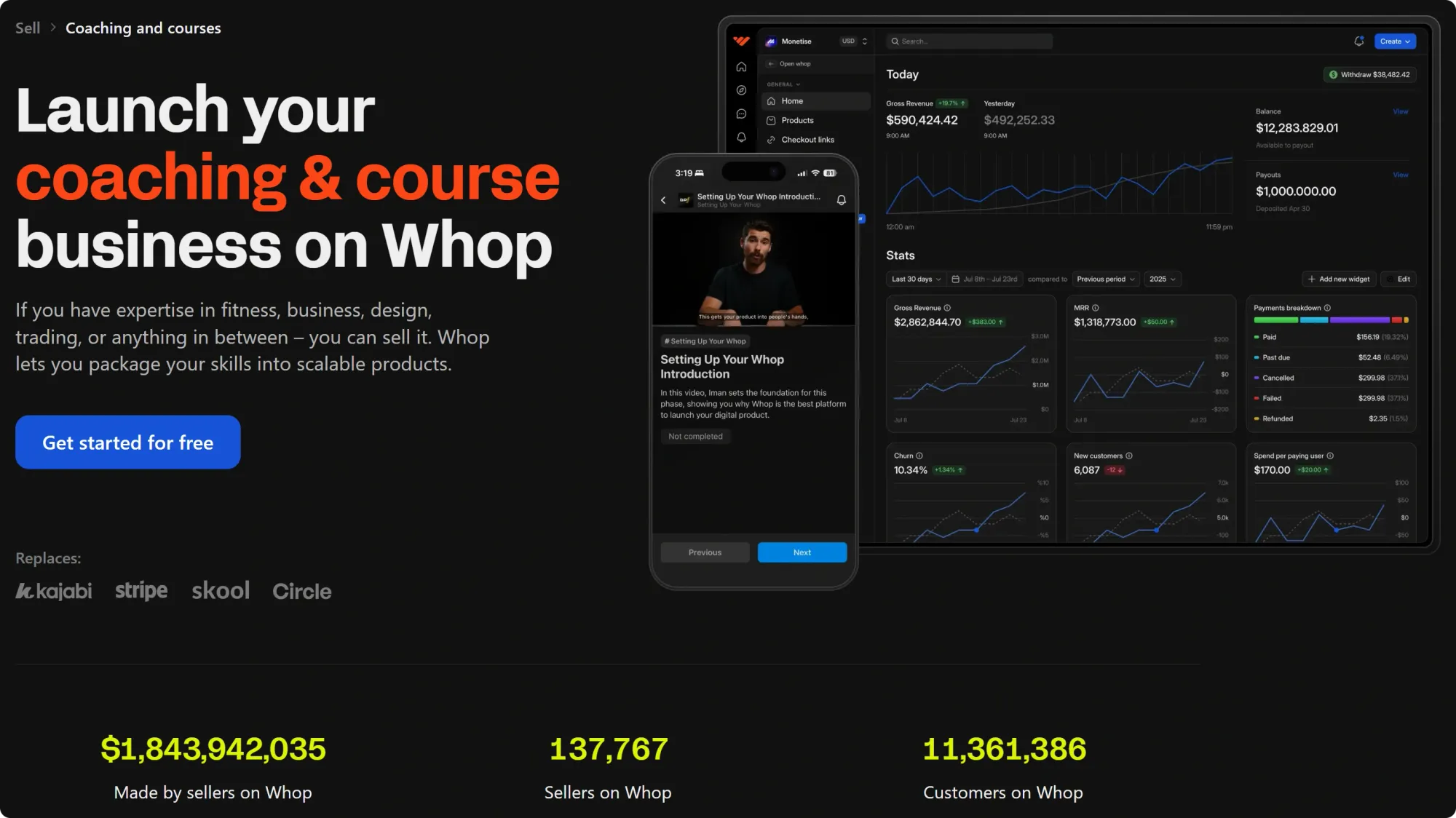
Whop is an all-in-one platform where you can sell courses, coaching, digital products, and more. Creators have earned over $1.8 billion so far on the platform.
You can build courses with Whop's Courses app, then add other apps to customize your platform - like the Chat and Forums apps. By experimenting with different app combinations, you can sell from ebooks to paid communities.
Setting up your business on Whop is simple - all you have to do is sign up to Whop, create your own platform, add the Courses app, create products, and start selling.
Whop is free to use and has just a %2.7 + $0.30 transaction fee.
Key feature: Sell any sort of digital product and use a variety of teaching tools via the apps you can use in your whop hub.
Price: Free to use, with an industry-leading 2.7% + $0.30 transaction fee plus processing charges.
Best for: Digital creators and online entrepreneurs including online teachers, tutors, and coaches.
2. Thinkific
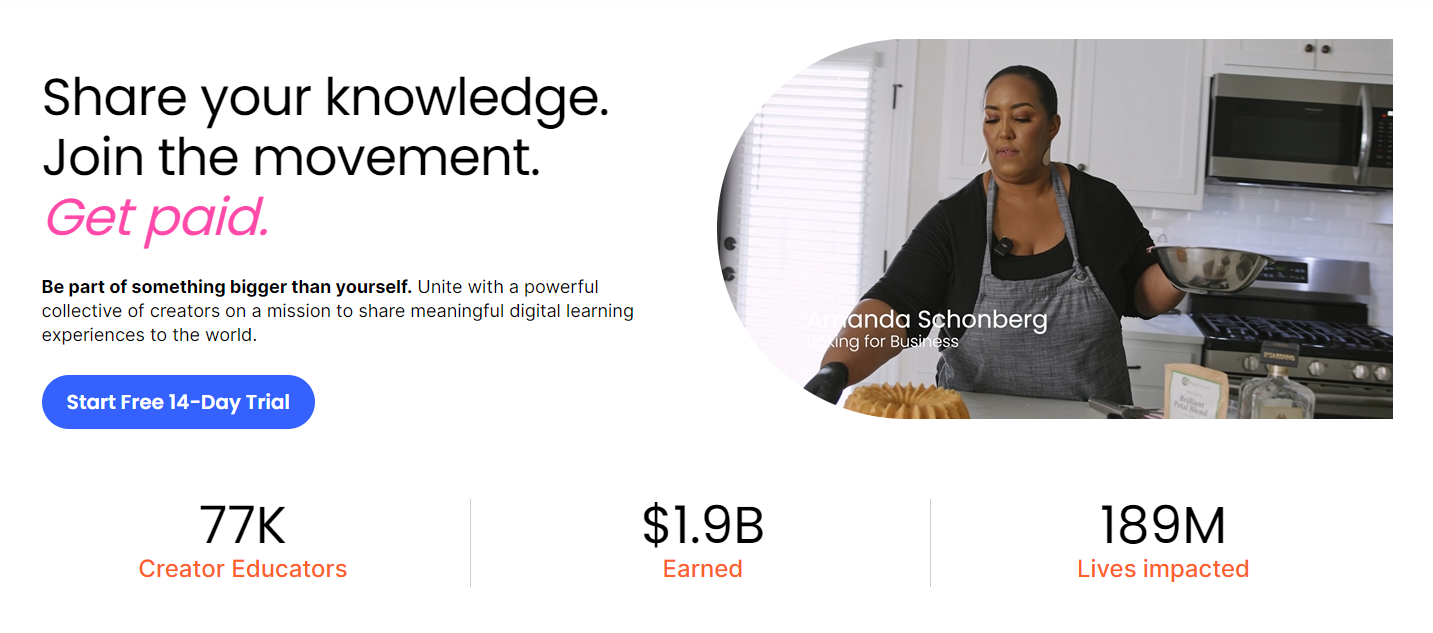
Thinkific is a platform that specializes in knowledge-sharing via courses, communities, and digital downloads, making it one of the top online teaching platforms out there. There are a million courses on the platform already, with 25,000 registered creators and $1.7 billion in gross merchandise value earned by users to date.
These numbers show that Thinkific has clout as far as online teaching goes, and it’s because the platform has plenty to offer—you can create video courses easily via their course builder and set up a website in a fraction of the time it’d normally take. Additionally, you can supplement your course with different types of media including quizzes and surveys that enhance the experience.
You're able to host live events with Thinkific too, and take advantage of the platform’s variety of marketing tools and integrations. Or, build out your own white-label online teaching app that users can download on their phones. You’ve also got powerful community-building features at your command, so there are plenty of options to develop a compelling digital product ecosystem around your online teaching.
Key feature: Variety of digital learning products including course builder, community, white-label app, and more.
Price: Starting from $36 per month, although there is a very limited free plan for creators who are just starting.
Best for: Creators who want an all-in-one online teaching solution and aren’t affected by the subscription pricing model.
3. Udemy

Udemy is one of the biggest names in online teaching, boasting a selection of over 250,000 video courses for platform visitors to browse and choose from. With 16,000 companies and over 65 million students on the platform, Udemy is a place to go if you need a platform that can connect you to its own audience—but there’s plenty of competition from other instructors for visibility too.
If you want to teach on Udemy, you’ll have to apply to do so. This can be an issue for a lot of creators, and it’s an immediate signpost of just how much power the platform is going to have in this relationship going forward. That being said, it does allow Udemy to advertise a certain standard of quality instruction, and your application will be criticized constructively if at all.
Once you’re up and running as a verified instructor, you can start creating your online course on Udemy. It’s going to be a video course, so you’re limited in what you can do, but Udemy makes up for that on the marketing front by giving you access to its vast audience of customers.
It’s worth noting that marketing is a crucial part of how you get paid, too—if you rely on Udemy and people book your courses via its marketplace, you only pick up 37% of the sale. On the other hand, if customers sign up for a course using your coupon or referral link, thereby bringing business to Udemy through your initiative, you get 97% of the sale.
Key feature: The Udemy marketplace is well known and has the potential for massive discoverability if you’re able to work the algo or get into hot niches early.
Price: Free to sign up and list your video courses, but Udemy takes a 3% cut of your referral sales and a 63% cut of your marketplace sales.
Best for: Teachers without their own audience but with the ability to create courses for specific niches before they get oversaturated. Creators or online tutors with their own following will get more mileage from other platforms offering a greater selection of products and tools.
4. Teachable
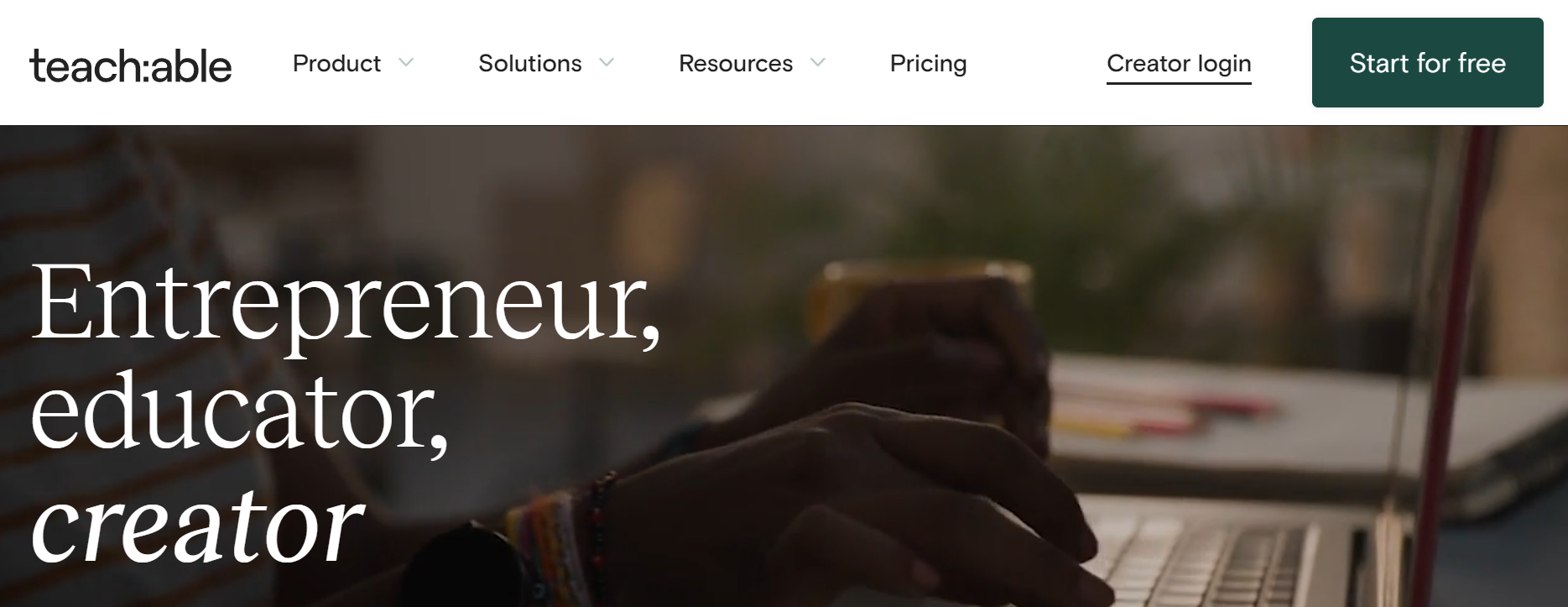
Teachable is a cloud-based learning management system (LMS) that allows teachers to develop courses as well as other digital products. It’s been around since 2013 and today boasts over 100,000 instructors and 18 million students on the back of a simple, easy-to-use experience for all.
Once you sign up, Teachable lets you create a course without needing to know any code. You can sell this course and any other digital products you have to offer on a single page. This serves as a digital storefront for your online teaching business.
There are a wide variety of courses already on Teachable, and you can use it for just about any sort of niche. The content restrictions on the platform make sense and aren’t too overbearing, and the hosting for the content you upload is rock solid. Teachable also does affiliate marketing really well, which is an advantage for creators looking to monetize their skills.
The free plan is worth considering if you’re just starting off, but you can only have ten students. That does allow you to build your product out and use this starting revenue to upsize; although, it’s worth looking at the restrictions and limitations levied by the different premium options—Teachable does restrict how many of your courses and downloads are available to students, unless you’re on Pro Plus.
Key feature: No-code, easy to use interface and course builder.
Price: There’s a free plan, but you may have to go up to the Pro or Pro Plus plans at well over $100 to really unlock Teachable’s potential.
Best for: Creators needing a platform that’s easy to adapt to and use.
5. Podia
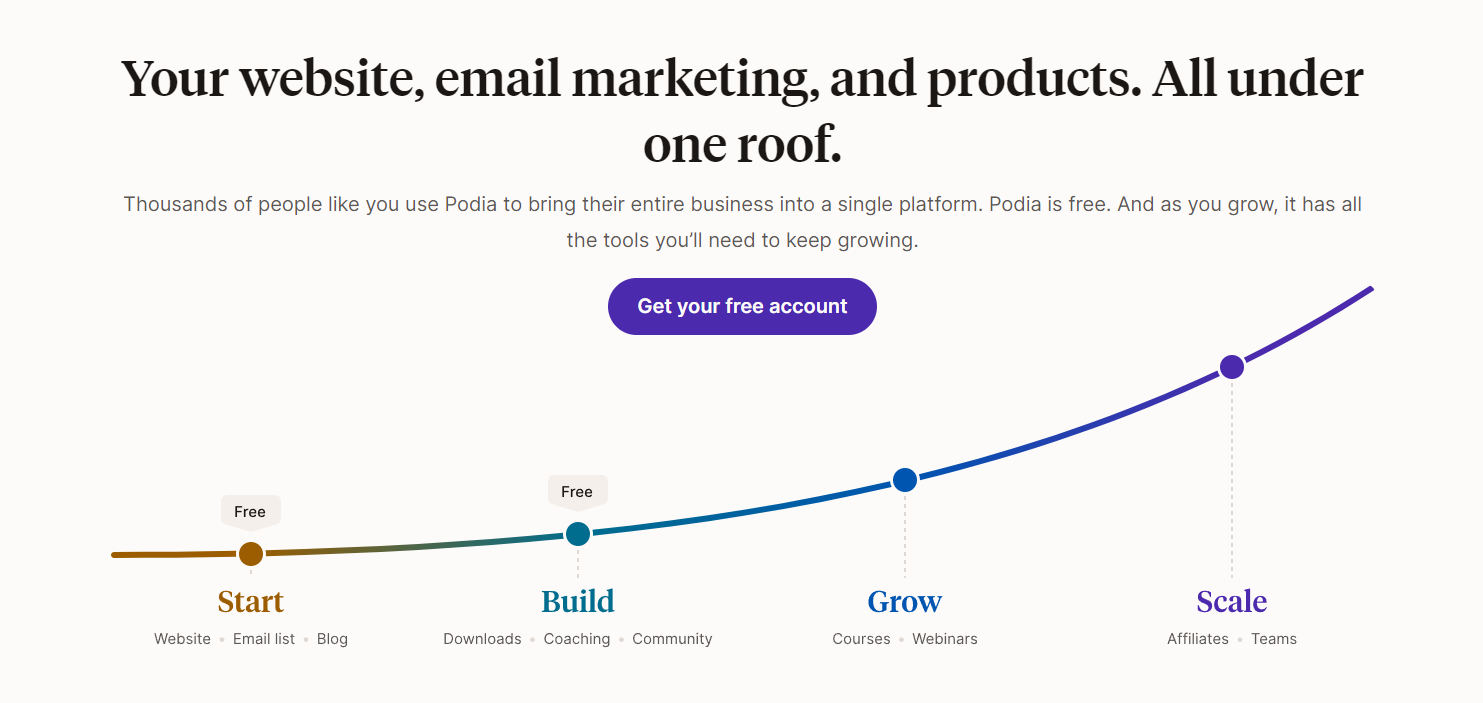
Podia is a one-stop solution for online entrepreneurs focused on digital products, and online learning via courses is a big part of the platform’s offering. You can also run webinars and workshops on Podia and let your students download a whole host of different file formats, so it has all of the bases covered when it comes to online teaching.
Podia also has an intuitive website builder and matches your templates nicely with email marketing, letting you build a consistent look and feel around your brand. It’s become a popular choice among creators as a result, with over 6,700 stores live on the platform.
If you want to try Podia out, there’s a free plan with which you can build out a complete website, blog, and online community. It comes with a 10% transaction fee, and limits the number of downloads and coaching products you can offer to one.
So, you can get started and try Podia out for free, but you’ll need to switch over to premium before too long in order to offer more courses and stop that big transaction fee from cutting into your profits.
Key feature: Template-based website builder and email marketing.
Price: Free plan allows you to get a taste of what Podia offers, but their Mover and Shaker plans at $33 and $59 per month are probably what’ll interest you the most.
Best for: Creators wanting a budget platform.
6. Skool
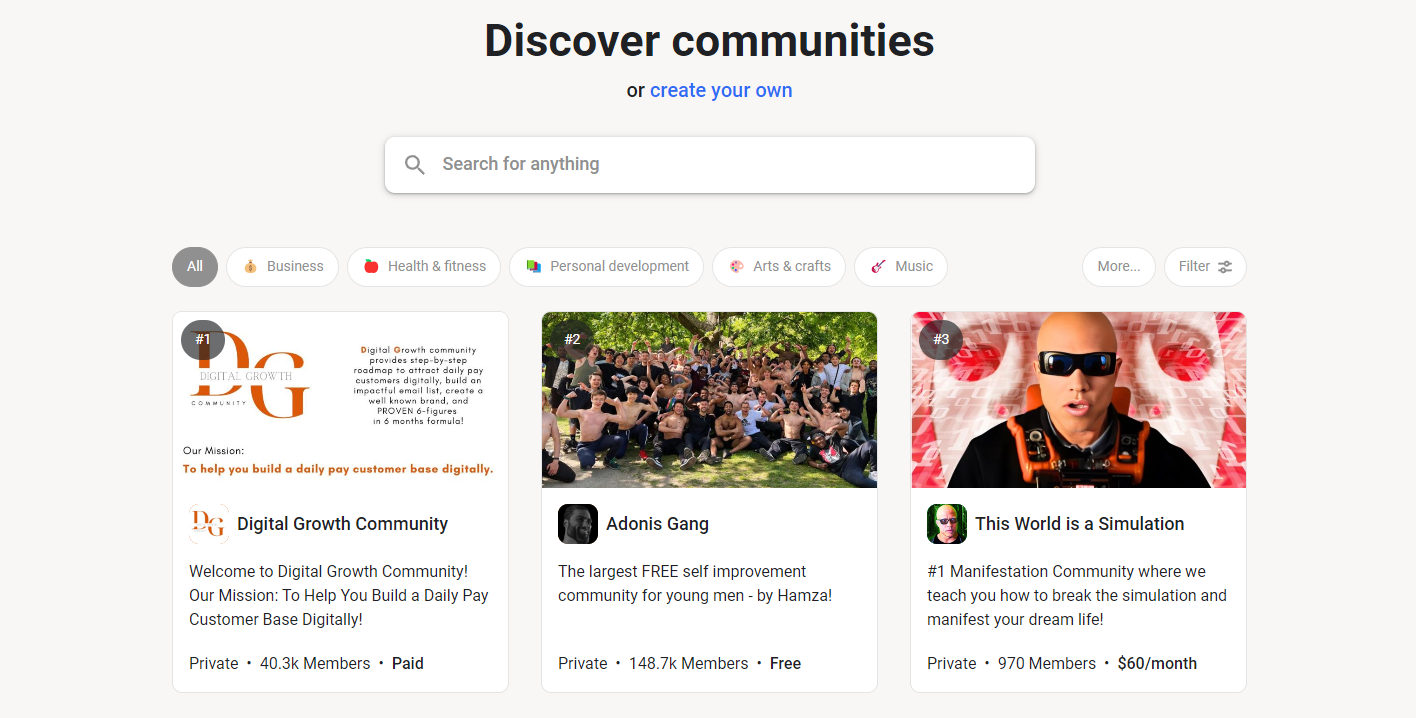
Skool is an online course platform that mixes in community elements as well as a touch of gamification to bring something a little different to the online teaching equation. Founded by Sam Ovens in 2019 and in beta for three years beyond that, Skool is a relatively new name in the industry but has made quite a splash.
The platform offers a 14-day free trial if you want to check it out but otherwise keeps things extremely simple—whether you’re a brand new creator or transitioning to Skool with a large audience in tow, you’ll need to pay $99 per month. It’s one-size-fits-all with Skool, although there’s also a small transaction fee when payments are processed.
Getting started with Skool is a matter of creating a community, which can either be open or a private group. You can then engage the Skool course builder and add videos, which need to be embedded from another platform. Each course that you create on the platform is broken down into sets, and these sets can have one or more modules containing video, links, resource files, and text.
Key feature: Community-based learning and gamification via student profiles and activity tracking.
Price: $99 per month with a 14-day free trial.
Best for: Online teachers looking to develop their online education as a community-first product.
7. Kajabi

Kajabi is a premium creator platform that simplifies the online teaching process by adopting a no-code approach and letting creators develop multiple digital revenue streams. It’s one of the biggest players in the online coaching industry, with 75 million students served and over $6 billion in revenue earned by creators.
This platform has been around for over ten years, and online courses have historically been its strength. Today, however, there’s a notable transition toward paid memberships and different forms of content, like podcasts, which tend to work well alongside Kajabi's membership model.
Using Kajabi is extremely easy, and you can get yourself set up with a website and digital store quickly using their templates and different design tools. Their course builder is on par with the top choices on this list, but you will have to pay for the quality on offer—Kajabi’s cheapest plan starts at $119, which is where most other platforms top out, and their premium option goes for well over $300 per month.
Key feature: Easy, efficient digital product builder letting you set up courses and communities quickly.
Price: Basic plan costs $119 per month, Growth costs $159 per month, and Pro will set you back $319 per month if you pay annually.
Best for: Creators with a large following and enough revenue that the Kajabi subscriptions don’t take too much of a bite out of their profits.
8. LearnWorlds

LearnWorlds is an enterprise-level learning management system that presents itself as the top AI-powered course creation platform in the industry. Whatever your feelings are about the state of AI in 2024, LearnWorlds is a robust and efficient platform for the creation, hosting, and marketing of your online teaching business.
LearnWorlds is easy to use and provides you with a no-code experience like many others on this list. Its support network is a stand-out strength alongside the LearnWorlds Academy. This academy can skill you up quickly both in terms of course creation but also getting the most out of the platform and its marketing capabilities.
The AI aspect of LearnWorlds comes in with course creation, where it employs generative AI to help you create program outlines and text to pad out your content. You probably don’t want to let AI take over and create entire courses from scratch, but if you just need a little help with structure or a little added fluff, then there’s no reason not to use it.
It’s important to note that, while LearnWorlds has an array of powerful features that can make your online teaching experience a breeze, they tend to be paywalled behind the platform’s more expensive pricing tiers.
Key feature: Generative AI course creator, customizable course player, and an assessment builder to help keep your students on the right track.
Price: Starts at $29 per month going up to $299 for the LearnWorlds Learning Center plan.
Best for: Mature online teaching businesses looking for a powerful LMS that can streamline a lot of processes.
9. Wise

Wise, not to be confused with the payment processor formerly known as TransferWise, is a learning management system that’s tailored to scaling teaching businesses, regardless of the type of learning styles you cater to or what content your courses contain.
It also has a few useful integrations, including Zoom when you want to do live teaching, and features tools like interactive quizzes, lesson agendas, and learner performance reports. It even integrates with WhatsApp so you can configure automated lesson reminders for your students.
Digital rights management (DRM) encryption helps to maintain intellectual property control with Wise, but marketing isn’t a notable strength of the platform—it’s got fewer marketing-based features for you to take advantage of than most of the other names on this list that place higher.
Key feature: Automated reminders via WhatsApp and email, and a feature set tailored to live teaching of both individuals and groups.
Price: There’s a limited free option, and paid plans start at $49 per month.
Best for: Online coaches and tutors looking to focus on live instruction.
10. SC Training

Formerly known as EdApp, SC Training is an online teaching platform that focuses on microlearning for enterprises. All of its tools are geared toward employee education at scale, and it's a great choice if your student base includes frontline teams.
SC Training has a great selection of course templates, which makes the process a lot easier—it’s all prebuilt, so you can pick your course template and just start editing with your own content. When your course is ready, it can be delivered right to your students’ mobile devices for learning on the go.
You can also enjoy a white-label experience with SC Training, which means it’ll just be your branding that’s visible if you’re on the right plan. This isn't just content delivery either; your online teaching can be interactive, with quizzes, assessments, and even games being part of the app.
Key feature: White-label product and pre-built courses that you can deliver with minimal editing.
Price: Free plan for up to 10 students, with paid plans adding students at $5 per head per month.
Best for: Online teachers who don’t prioritize monetization and additional digital products.
11. Maven

Maven is a platform that specializes in live teaching, whether that’s individuals or groups. There are hundreds of cohort-based courses to choose from covering a wide variety of subject matter, and you can tailor interactive learning experiences to your students via the platform thanks to its emphasis on active learning.
The Maven Course Accelerator program is designed to get you creating quickly, and there’s a resource library to help you out even further. There’s also an instructor community to jump into if you want to learn the ins and outs of the platform from other online teachers who have been there and done that.
It’s important to note that Maven is free to use but charges a 10% transaction fee per payment, and it also doesn’t offer much in the way of marketing tools nor customization options.
Key feature: Cohort-based courses and plenty of onboarding resources including a supportive instructor community.
Price: Free to use with a 10% transaction fee for enrollments.
Best for: Online teachers looking to focus purely on live lessons.
12. OpenLearning

OpenLearning is a social learning platform that counts among its partners some of Australia’s leading universities, with 300 institutions in all delivering online education to upwards of 3 million learners.
OpenLearning specializes in short courses that can be given in a flexible manner, using a micro-credential framework that can just as easily give students a taste of a new subject as it can help to upskill and reskill.
Given its focus on institutional customers, it should come as no surprise that OpenLearning offers a branded portal with a custom domain. You can also give students a branded certificate of completion once they’re done with your course.
Key feature: Short courses with micro-credentials and a custom brand portal.
Price: Starts at $1,170 per year.
Best for: Institutions, but you might be able to get plenty out of OpenLearning if you’re running an already-established education business.
13. FreshLearn

FreshLearn is a no-code platform that allows you to monetize your digital products, including online courses that you can pair up with assessments, live lessons, and even an e-learning mobile app.
FreshLearn is similar to several of the platforms that make up the top of this list thanks to how it gives you a one-stop solution that’s also very easy to use. It also supports you on the marketing front with clever automation and effective email campaigns. The platform is well known for its support, scoring very well among customers as a result.
It’s an affordable option for creators at different levels. Its flagship No Brainer plan clocks in at just $49 per month, but there are several features including white-label customization, custom certificates, and advanced assessments on their premium option.
Key feature: Multiple digital product options including courses as well as memberships.
Price: FreshLearn has a limited free option and a basic plan costing $29 per month, but everything’s unlocked at No Brainer Plus for $119.
Best for: Creators wanting a quick start on their online teaching journey.
14. LearnDash
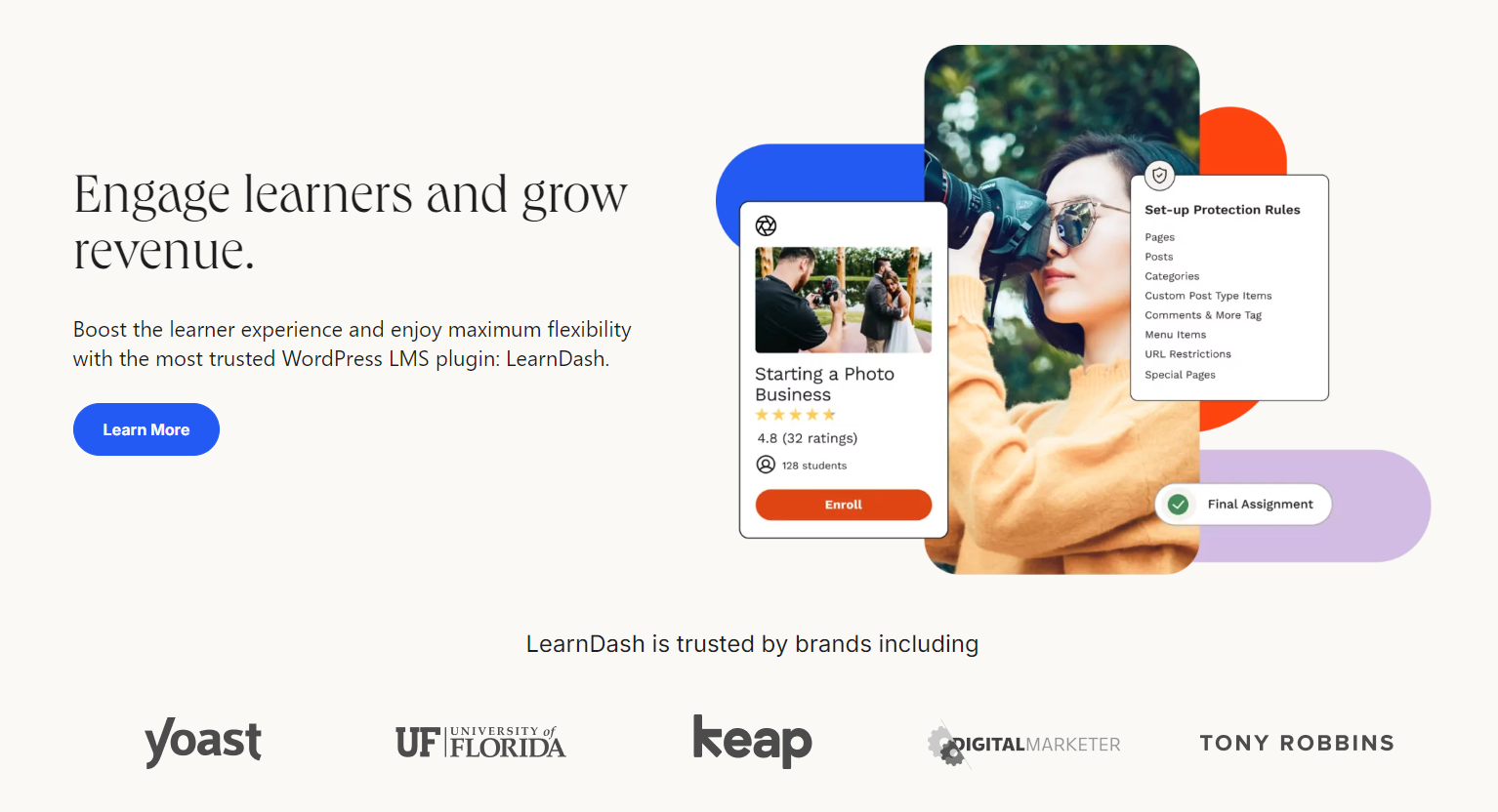
LearnDash is an LMS platform that functions as a WordPress plugin, so it might be one of your first choices if you’re already running a WordPress website for your online teaching business.
LearnDash has a variety of course creation tools for you to deploy via its drag-and-drop interface, and you can then customize the course design to match the existing branding that you have for your business. You can also give your students grades and certificates at the end of the course; this may come off as a small benefit but is in fact highly underrated when it comes to effectiveness and desirability on the part of the learner.
You can sell access to any sort of content on your WordPress website using LearnDash, so you can add other digital products that complement your teaching too.
Key feature: LMS plugin for WordPress.
Price: Starts at $25 per month.
Best for: Online teachers who already have a WordPress site and want to keep it central to their business.
15. Arlo

Arlo is an online teaching and training platform that focuses on enterprises, giving companies the tools and features they need to skill up and reskill their employees. That being said, Arlo also does a good job for external providers (that’s you) and allows you to take on paying customers via their platform.
You can integrate your existing website or set one up with Arlo, and take advantage of the platform’s many integrations to provide the coaching experience you want—that being said, it doesn’t feature a course builder, so you’ll have to get your materials together some other way.
It also doesn’t offer any community-building features, which alongside the absence of a course creator doesn’t really suit the online teacher who’s just starting off. However, the platform can work for you if your students are mostly corporate and are used to the platform’s integrations and easy scheduling features.
Key feature: Training management functions for companies.
Price: Starts at $179 per month plus fees per registration.
Best for: Companies looking for employee training solutions.
16. Skillshare

Skillshare is an online education platform that’s often mentioned in the same breath as Udemy, but it’s targeted more towards creative types. There’s still a huge number of courses on the platform covering a variety of topics, including those that are more traditional such as productivity and marketing.
It also works similarly to Udemy in that as a teacher, you’re gaining access to a big market of learners that you otherwise might not have access to, and therefore you’ll get more revenue from a student signing up using your referral link. That being said, the revenue split is far more in Skillshare’s favor, with teachers only picking up 20% of subs earned by the platform.
There’s also an approval process when you want to sign up for Skillshare. But, it’s totally free to use, and there’s a supportive community of teachers on the platform to link up with and learn from.
Key feature: Well-recognized marketplace with a good number of learners you can gain access to.
Price: Free to use, but Skillshare’s revenue-sharing model favors the platform itself rather than teachers.
Best for: Teachers who don’t have an existing audience and are able to spot lucrative niches quickly.
17. The Leap

The Leap is a service that puts a new twist on online learning by providing bite-size content that’s taken in with swipes and taps of a mobile screen—it’s micro-learning taken to the extreme, and it’s been proven effective as well as simple to set up and build.
You’ll also get a link-in-bio storefront with The Leap, allowing you to set up your online teaching products next to any other sort of social media channels or digital businesses you have going. The service takes care of email marketing to let you develop automated flows and get more impressions, too.
There’s also AI on the platform to help you pad out your content. It’s easy to use, featuring a mobile-first product builder and customizable landing pages.
Key feature: Mobile-first micro-learning for a tappable learning experience.
Price: There’s a free option, but paid plans with more features start at $19 per month.
Best for: Digital creators focusing exclusively on the mobile platform and who believe in micro-learning.
18. Mighty Networks

Mighty Networks is a community hosting platform that a lot of teachers are using to combine courses and community into a digital business. You’ll find a variety of digital products such as workshops and coaching calls on the platform, known for managing communities around an activity feed, chat, a member list, and a resource library.
You can customize your Mighty Networks community to a point, and you’ll get a .mn.co subdomain once you choose a name for your online teaching community. Then, AI pops in to create headers and themes based on the keywords you input, before going on to load up your community with polls and conversation starters to get engagement going right away.
It’s worth noting that you can get your own custom subdomain if you pick one of Mighty’s premium plans, and upgrading through the tiers also gives you white-label emails and further customization options. Mighty Pro, which is the platform’s bespoke pricing option, also gives you the option of creating your own branded mobile app.
Key feature: Community space centered around a member list and activity feed, which not all platforms offer.
Price: $49 for the basic plan all the way up to $319 for the premium Path-to-Pro plan.
Best for: Online teachers looking to build a community first and foremost.
19. Moodle

Moodle is a course management system that takes the shape of a free, open-source software package written in PHP and distributed under the GNU General Public License. It can be accessed offline as well as on mobile via the Moodle App, and features an easy-to-use, inclusive interface alongside fully compliant safety and security.
The platform is generally used for K-12 classrooms, higher education, as well as vocational training, with the features and functions needed in these applications. It’s also easy to scale, and if you’ve got the technical chops, you can build and host your own Moodle site.
Moodle is one of the top learning management systems in U.S. higher education, but it does offer options at the starter or entrepreneur levels via easy classroom setups and scalable hosting. It’s got all the features you might want if you take a more traditional teaching approach, including assessments, learning pathways, and powerful scheduling.
Key feature: Different content formats, social learning and collaborations, tests, analysis, and reporting for learners.
Price: Starts at $130 per year, going up to $1,750 per year.
Best for: Educational institutions.
20. Coursera

Coursera is an online teaching platform that offers a variety of courses, running the gamut from free courses to online degrees. The former tend to be quite short, but degree courses on the platform can be just as long as their equivalents at a traditional institution.
This platform has a somewhat more scientific focus than many other platforms on this list, as you might imagine for a platform offering certificate and degree courses. The ability to offer these courses comes via partnerships with universities and other educational institutions. As such, you can’t sign up as a freelance instructor. Rather, you’ll have to create a business, and then partner up with Coursera as a provider.
Any sort of business can apply to become a partner, and there are no restrictions when it comes to size, location, or subject matter offered. There aren’t any fees from becoming a partner, but getting signed up with the platform is subject to the status of your application.
Key feature: Selling your courses on a platform known for offering accreditation and degrees from some of the biggest institutions (companies as well as universities) in the world.
Price: Free to use, according to Coursera.
Best for: Formally registered businesses.
Choosing the perfect teaching platform for your online teaching business
There are a number of excellent online teaching platforms out there no matter what the scope or scale of your business is. Picking just one to use can be a tall order even given that we’ve set up a ranked list for you above. So, here are a few things you should consider when picking an online teaching platform:
- Pricing: Compare transcation fees and monthly costs. Platforms that charge you 10% or more in fees will cost more than $300 per month once you start earning $3,000 or more. If you’re just starting out, pick one that’s got a free plan with plenty of features.
- Teaching features: One of the most important features to look out for is a course builder. You’ll also want to look for functions like chat apps and video calls to allow you to communicate with your students in various ways and teach live in addition to offering courses.
- Coding requirement: You’ll also want to know how much coding knowledge you’ll need to get your courses and teaching business set up. Many of the top platforms on our list feature easy-to-use interfaces and functions like drag-and-drop course builders, so make sure to check on this unless you’ve got enough coding expertise that it isn’t an issue for you.
- Marketing tools: Make sure that the platform you choose assists you as much as possible on this front. Features like email marketing and affiliates can be invaluable. Also look for discoverability - some platforms have their own, meaning that you can score students from platform visitors in addition to your own marketing efforts.
Maximize your online teaching income with Whop

Whop has everything you need for success as an online teacher. You can get started in minutes with an extremely easy sign-up process, and building out a teaching hub is just a matter of dragging and dropping apps into your whop.
From a pricing standpoint, Whop can’t be beaten either, with just 2.7% + $0.30 transaction fees and the ability to fully customize the features of your platform, whether it's adding community features like the Chat and Forums apps or the built-in customizable affiliates programs.



